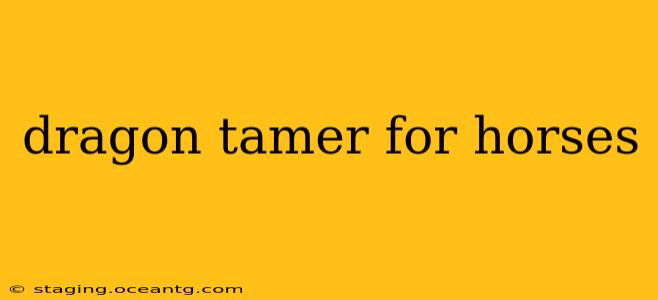The term "dragon tamer" conjures images of mythical beasts and daring heroes. But in the world of equine training, it's a metaphor for a skilled professional who can handle even the most challenging horses. This isn't about fire-breathing lizards; it's about understanding, patience, and a deep knowledge of equine behavior and psychology. This article delves into the techniques and philosophies behind successfully training difficult horses, addressing some common questions along the way.
What Makes a Horse Difficult to Handle?
Many factors can contribute to a horse exhibiting challenging behaviors. It's crucial to understand the root cause before attempting any training. Underlying issues could include:
- Past trauma or neglect: A horse with a history of abuse or mistreatment may develop fear-based behaviors, making it reactive and difficult to approach.
- Poor training: Inconsistent or harsh training methods can create anxiety and confusion, leading to resistance and undesirable habits.
- Physical discomfort: Pain from an injury or illness can manifest as aggression or unpredictable behavior. A thorough veterinary checkup is essential.
- Genetic predisposition: Some breeds or bloodlines may have a naturally more spirited or sensitive temperament.
- Environmental factors: Stressors such as overcrowding, unfamiliar surroundings, or loud noises can exacerbate existing problems.
Understanding these potential causes allows trainers to develop tailored approaches.
What are the Methods Used by a "Dragon Tamer" for Horses?
A true "dragon tamer" for horses doesn't rely on force or intimidation. Instead, they employ positive reinforcement techniques focused on building trust and understanding. Common methods include:
- Desensitization: Gradually exposing the horse to feared stimuli in a controlled manner, rewarding calm behavior.
- Classical conditioning (Pavlovian conditioning): Associating positive experiences with previously negative stimuli.
- Operant conditioning: Using rewards and consequences to shape desired behaviors.
- Natural Horsemanship: This philosophy emphasizes understanding the horse's natural herd dynamics and using gentle, respectful techniques.
- Equine-Assisted Therapy: In certain cases, specialized therapy may be required to address deep-seated trauma.
How Do I Find a Qualified Horse Trainer?
Finding a qualified and ethical trainer is paramount. Look for trainers who:
- Prioritize positive reinforcement methods: Avoid trainers who use harsh or punitive techniques.
- Have experience working with challenging horses: Ask for references and testimonials.
- Emphasize safety: Safety for both the horse and the handler should always be the top priority.
- Are knowledgeable about equine behavior: A good trainer will be able to explain the reasons behind a horse's behavior.
- Are certified or affiliated with reputable organizations: This demonstrates a commitment to professional standards.
What is the Difference Between a "Dragon Tamer" and a Regular Horse Trainer?
The distinction lies in the expertise and approach. While all good horse trainers aim to build a relationship with their equine partners, a "dragon tamer" possesses a specialized skill set to address deeply ingrained behavioral problems. They often have experience working with horses that have a history of aggression, fear, or other challenging behaviors. A regular horse trainer may focus more on basic training and riding skills.
Can I Train My Difficult Horse Myself?
While some owners can successfully address minor behavioral issues with consistent training and patience, attempting to train a truly challenging horse without professional guidance can be dangerous. It's best to seek the help of an experienced trainer, especially if you lack confidence or experience.
What are the Costs Associated with Hiring a "Dragon Tamer"?
The cost of hiring a professional horse trainer varies considerably based on the trainer's experience, location, and the severity of the horse's behavioral issues. Expect to invest a significant amount of time and money, but the results will be well worth it if you're dedicated to resolving the underlying problems and creating a harmonious relationship with your horse.
Disclaimer: This article provides general information and should not be considered professional advice. Always consult with a qualified equine veterinarian and professional horse trainer for specific guidance on your horse's needs.
